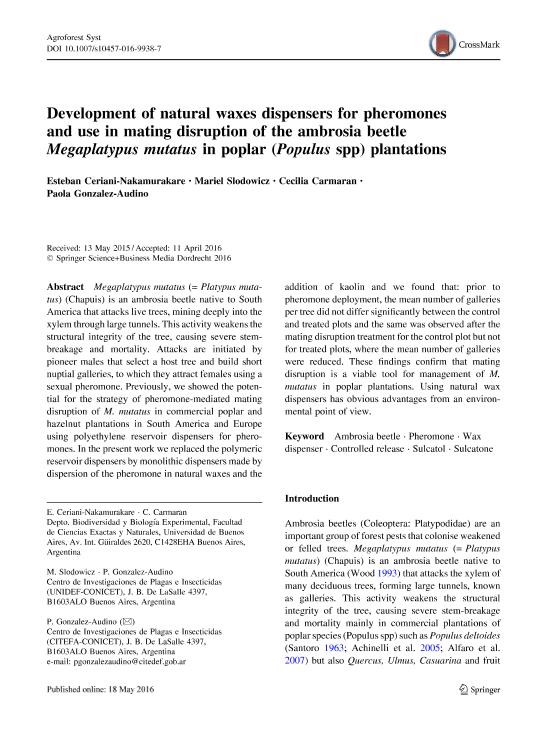Artículo
Development of natural waxes dispensers for pheromones and use in mating disruption of the ambrosia beetle Megaplatypus mutatus in poplar (Populus spp) plantations
Ceriani Nakamurakare, Esteban Daniel ; Slodowicz, Mariel Pamela
; Slodowicz, Mariel Pamela ; Carmaran, Cecilia Cristina
; Carmaran, Cecilia Cristina ; Gonzalez Audino, Paola Andrea
; Gonzalez Audino, Paola Andrea
 ; Slodowicz, Mariel Pamela
; Slodowicz, Mariel Pamela ; Carmaran, Cecilia Cristina
; Carmaran, Cecilia Cristina ; Gonzalez Audino, Paola Andrea
; Gonzalez Audino, Paola Andrea
Fecha de publicación:
05/2016
Editorial:
Springer
Revista:
Agroforestry Systems
ISSN:
0167-4366
Idioma:
Alemán
Tipo de recurso:
Artículo publicado
Clasificación temática:
Resumen
Megaplatypus mutatus (= Platypus mutatus) (Chapuis) is an ambrosia beetle native to South America that attacks live trees, mining deeply into the xylem through large tunnels. This activity weakens the structural integrity of the tree, causing severe stembreakage and mortality. Attacks are initiated by pioneer males that select a host tree and build short<br />nuptial galleries, to which they attract females using a sexual pheromone. Previously, we showed the potential for the strategy of pheromone-mediated mating disruption of M. mutatus in commercial poplar and hazelnut plantations in South America and Europe using polyethylene reservoir dispensers for pheromones. In the present work we replaced the polymeric reservoir dispensers by monolithic dispensers made by dispersion of the pheromone in natural waxes and the addition of kaolin and we found that: prior to pheromone deployment, the mean number of galleries per tree did not differ significantly between the control and treated plots and the same was observed after the mating disruption treatment for the control plot but not for treated plots, where the mean number of galleries were reduced. These findings confirm that mating disruption is a viable tool for management of M. mutatus in poplar plantations. Using natural wax dispensers has obvious advantages from an environmental point of view.
Palabras clave:
Ambrosia Beetle
,
Pheromone
,
Wax Dispenser
,
Controlled Release
Archivos asociados
Licencia
Identificadores
Colecciones
Articulos(OCA CIUDAD UNIVERSITARIA)
Articulos de OFICINA DE COORDINACION ADMINISTRATIVA CIUDAD UNIVERSITARIA
Articulos de OFICINA DE COORDINACION ADMINISTRATIVA CIUDAD UNIVERSITARIA
Articulos(SEDE CENTRAL)
Articulos de SEDE CENTRAL
Articulos de SEDE CENTRAL
Articulos(UNIDEF)
Articulos de UNIDAD DE INVESTIGACION Y DESARROLLO ESTRATEGICOS PARA LA DEFENSA
Articulos de UNIDAD DE INVESTIGACION Y DESARROLLO ESTRATEGICOS PARA LA DEFENSA
Citación
Ceriani Nakamurakare, Esteban Daniel; Slodowicz, Mariel Pamela; Carmaran, Cecilia Cristina; Gonzalez Audino, Paola Andrea; Development of natural waxes dispensers for pheromones and use in mating disruption of the ambrosia beetle Megaplatypus mutatus in poplar (Populus spp) plantations; Springer; Agroforestry Systems; 91; 3; 5-2016; 1-7
Compartir
Altmétricas



